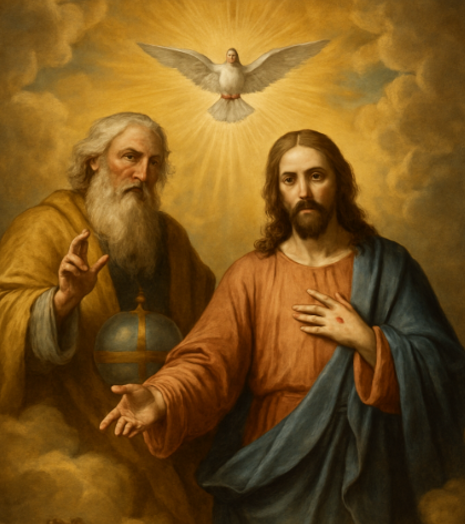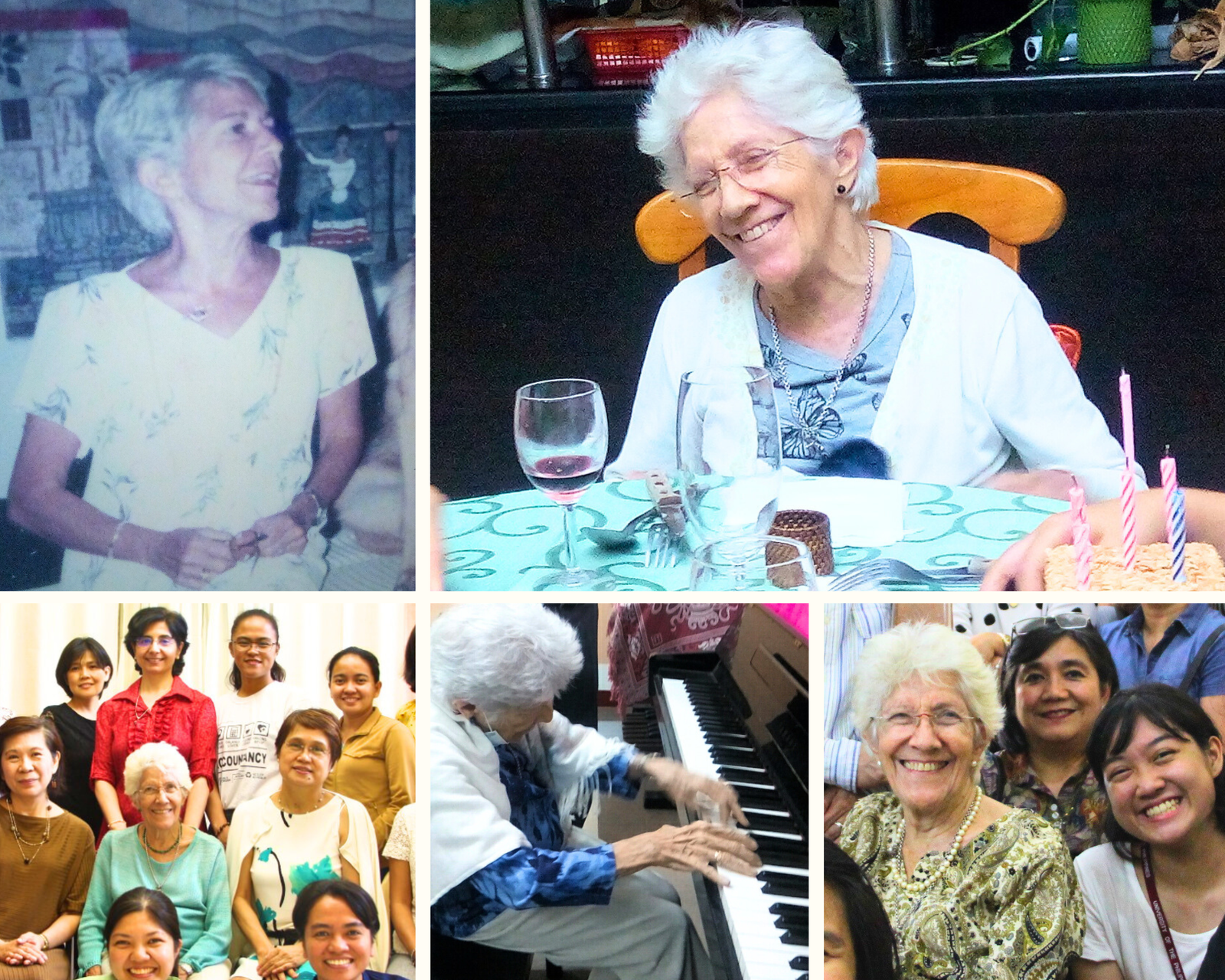
Gospel according to Saint John 16:12-15:
Jesus said to his disciples; “I have much more to tell you, but you cannot bear it now. But when he comes, the Spirit of truth, he will guide you to all truth. He will not speak on his own, but he will speak what he hears, and will declare to you the things that are coming. He will glorify me, because he will take from what is mine and declare it to you. Everything that the Father has is mine; for this reason I told you that he will take from what is mine and declare it to you.”
What is life?
Luis CASASUS President of the Idente Missionaries
Rome, June 15, 2025 | The Most Holy Trinity
Prov 8: 22-31; Rom 5: 1-5; Jn 16: 12-15
Wondering what life is all about isn’t just for professional philosophers. From time to time, it is something we all do, perhaps without words, to find meaning in a painful situation, a great ongoing effort, or a lack of motivation in what we have to do.
A few days ago, at a retreat, a young man of good will, but immersed in the frenetic urban life, confessed that, for him, life was working long hours, a little time with his family, and some sports. A sadly typical case.
But Jesus Christ tells us: Whoever loves me will keep my word, and my Father will love him, and we will come to him and make our home with him (…). The Holy Spirit, whom my Father will send in my name, will teach you all things and remind you of everything I have said to you (Jn 14:23-24). This, then, must be an essential key (the key) to understanding what life is, our life, beyond a succession of activities and concerns. The Holy Trinity is permanently within us, for we are his dwelling place, however unworthy we may consider ourselves to be. But this is not just an honor; it is our true life. On one occasion, St. John Paul II reminded us that human beings have three dimensions in their lives:
* Participation in eternal life, that is, not being lost, living fully from now on, thanks to our belief in Christ (Jn 3:15).
* Being a new creature, permanently renewed by the action of the Holy Spirit: So, if anyone is in Christ, he is a new creation; the old has gone, the new has come (2 Cor 5:17).
* Living as children, in communion of love with our heavenly Father: The Spirit himself testifies with our spirit that we are God’s children (Rom 8:16).
It is significant that Pope Francis also spoke of three dimensions of human life (April 2, 2020) that we can match with the above.
The promise. This is the promise he made to us: eternal life (1 John 2:25). It is a promise centered on Christ and is a guarantee of the forgiveness of sins and the gift of the Holy Spirit.
The covenant, which is fulfilled in the cross of Christ and made present through the Holy Spirit. It is no longer a covenant written in stone, but sealed in the heart, and it implies: a living and personal relationship with God, participation in the Trinitarian life, and the call to live faithfully in response to the love received.
The election. Every Christian has been called by name, from eternity, to live as a child of the Father.God chose us in Christ before the foundation of the world (Eph 1:4).
This election means being called to live a new identity, that of a child; a mission, as a disciple; and a communion, as part of the Body of Christ.
Pope Francis, in his reflection, focused especially on the figure of Abraham, which makes his arguments even more remarkable, since this participation in the Trinitarian life was already announced in the Old Testament.
The manifestation of the Triune God makes us like God, not only personally, but also in the possibility of living a communion that is impossible for the world. As the Dogmatic Constitution Lumen Gentiumsays:
The Church is in Christ like a sacrament, that is, a sign and instrument of intimate union with God and of the unity of all mankind.
This is Christ’s desire, a unity that replicates that which exists in the Holy Trinity:
May they all be one, as you, Father, are in me and I in you, so that they may also be one in us, so that the world may believe that you sent me (Jn 17:21).
—ooOoo—
In practice, believing and taking into account the reality of the Holy Trinity has immediate beneficial consequences: It allows us to dialogue with the Father, the Son, and the Holy Spirit in an appropriate way, thus enabling us to identify the voice that speaks to us and, in this way, to respond appropriately at every moment of that Dialogue with Three Voices, as our Father Founder said.
It seems appropriate to recall today that this Dialogue with the Divine Persons is not only about truths or our moral life. It is not primarily a rational or discursive dialogue; it is a dialogue of our being. The essential communication is about love, and love does not always need explanation. As St. Paul says: The love of God has been poured into our hearts through the Holy Spirit who has been given to us (Rom 5:5).
The voice of the Father manifests itself as a continuous call to live our identity as children.
His voice reminds us who we are and where we should go. It is the voice that calls us to trust in his Providence and to rest in his love. When Jesus prays to the Father, he says: “Holy Father, keep those you have given me in your name” (Jn 17:11). In each of us, that dialogue is based on the past, on the certainty and experience that he has not abandoned us, that he has a plan for each of us, which is gradually being revealed, sometimes to our great surprise.
The voice of the Son is often a teaching on how to follow the path. This explains why He identifies Himself as the true Way (Jn 14:6). The simple memory of His image invites us to serve and live in communion with others. It reminds us that we have been made persons by His sacrifice, and this impels us to forgive in the same way. His presence is truly contagious, which is why He has sought to make that presence take many different forms:
– in the Eucharist,
– when two or more of us gather in his name,
– in the Word, which enlightens us in ever new ways. On many occasions, far from seeming like a text, we feel that Christ is speaking to our hearts.
– in our neighbor, who allows us to see the virtue and the same pain that moves God, present in those in need of all kinds. I was hungry and you gave me food…
– in explicit or implicit prayer, personal or communal, understood as a “state of prayer” of those who have only one intention in everything they do.
The voice of the Holy Spirit: inspiration and inner guidance
The Holy Spirit speaks to us from the depths of our hearts, enlightening our minds and guiding us in every decision. His voice is what comforts us in times of difficulty, impels us to act courageously, and gives us discernment to recognize God’s will.
This discreet and continuous dialogue with the Holy Trinity takes place in unexpected and varied ways. I would like to express it in a few verses:
You’re there again,
with the form of a luminous shadow
in the fertile desert of your absence
where dry bones are transformed
into determined blood
that carries new life through the arteries.
You are still there, in the silence
of a prayer that says almost nothing,
in the wounded word between your lips
in the gray landscape of a gaze
There you are again,
like that melody
that has entered my memory and accompanies me
as if it were the soul’s true master.
Otra vez estás ahí, //con aspecto de sombra luminosa//en el fértil desierto de tu ausencia
donde los huesos secos se transforman//en sangre decidida//que arrastra vida nueva en las arterias.
Sigues estando ahí, en el silencio//de la oración que apenas dice nada, //en la palabra herida entre los labios//en el paisaje gris de una mirada
Otra vez estás ahí, //como esa melodía//que ha entrado en mi memoria y me acompaña//como si fuera la dueña del alma.
—ooOoo—
Psalm 8, contemplating the dignity of human beings, describes them as powerful and weak at the same time. God, in his goodness, loves human beings in such a special way that he makes them his co-creators, collaborators in his work:
When I look at the heavens, the work of your fingers, the moon and the stars that you have created, what is man that you are mindful of him, the human being, that you give him power?
You made him a little lower than the angels, you crowned him with glory and dignity, you gave him dominion over the works of your hands.
You put everything under his feet: flocks of sheep and bulls, and even the beasts of the field, the birds of the sky, the fish of the sea, which trace paths through the sea.
—ooOoo—
This is what it means to be created in the image of the Holy Trinity, to share his authority over creation. His special dignity is the source of man’s greatness, which cannot be violated. The fact that the Law says that “we are gods” (Jn 10:34) allows us to live in the presence of the Divine Persons.
In Exodus, we see how Moses was tending sheep in the desert, as he did every day, after years of exile. He was not a prophet, nor a leader, nor a visionary. He was just a tired and seemingly forgotten shepherd.
One morning, he climbed Mount Horeb and there, in the midst of his routine, he saw a bush burning with fire, but it was not consumed. He approached it. Then he heard a voice: Do not come any closer. Take off your sandals, for the place where you are standing is holy ground.
Moses entered into the living presence of God. It was a real encounter, in which everything changed: common ground became holy, his life as a shepherd became his vocation, and his name was spoken tenderly by God himself. Living in God’s presence, like Moses, means pausing before the mystery when something in everyday life burns and takes on new meaning.
_______________________________
In the Sacred Hearts of Jesus, Mary and Joseph,
Luis CASASUS
President












